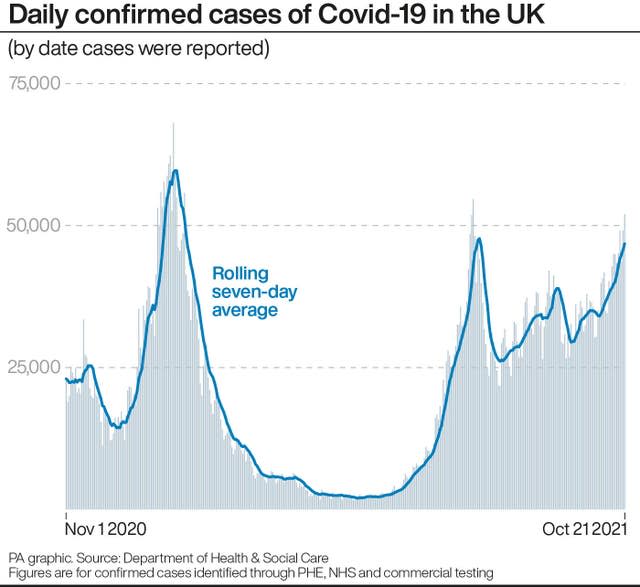Sage optimistic hospital admissions this winter will not exceed January’s peak
Top scientists advising on the coronavirus response have cautiously predicted it is “increasingly unlikely” that hospital admissions this winter will rise above the peak seen last January.
The Scientific Advisory Group for Emergencies (Sage) warned, however, that a “rapid increase in hospital admissions” could happen if behaviour swiftly returns to normal and the waning of vaccines’ effectiveness is significant.
Acting quickly would reduce the need for “more stringent, disruptive and longer-lasting measures”, the advisers concluded, in minutes of a meeting published on Friday.
They said that policy work on the potential reintroduction of measures “should be undertaken now” so they can be ready for “rapid deployment” if needed.

Their meeting on October 14 informed the Government’s thinking as Prime Minister Boris Johnson resists pressure to impose “Plan B” to control the spread of coronavirus this autumn and winter.
Led by chief scientific adviser Sir Patrick Vallance, Sage said the modelling does not consider the burden from flu and other viruses or the emergency of new variants.
“Although there remains uncertainty about the timing and magnitude of any future resurgence, these scenarios suggest hospital admissions above those seen in January 2021 are increasingly unlikely, particularly in 2021,” they wrote.
The scenarios assume that the rollout of boosters will be “rapid” and have a “high uptake” and warned that if people swiftly change their behaviour then there could be a major problem.

“A slower return to pre-pandemic behaviours and reduced waning are both expected to reduce and delay any further wave, although there remains potential for a rapid increase in hospital admissions if behaviours change quickly, and if waning is more significant and occurs after boosting,” they wrote.
The advisers said that there has been a “decrease in self-reported precautionary behaviours such as wearing a face covering”.
But they said that the reintroduction of working from home guidance is likely to have the “greatest individual impact” on transmission out of the measures under Plan B.
“Sage advised that policy work on the potential reintroduction of measures should be undertaken now so that it can be ready for rapid deployment, stressing the importance of reintroducing measures in combination, supported by clear communication, consistent implementation that avoids creating barriers to adherence, and clear triggers for deployment,” they added.
One paper prepared for Sage by scientists at Imperial College London, including Professor Neil Ferguson, warned that under a “pessimistic” scenario there could be nearly 10,000 deaths over the winter.
It said that any delay in the booster programme could result in “a much larger epidemic”.
It noted the projected scale of the winter wave was sensitive to small changes in assumptions about vaccine effectiveness.
Under the “most optimistic scenario,” it said current levels of protection in the population combined with the boosters should keep the spread of the virus “at levels similar to or lower than currently observed”.

It goes on: “However, under more pessimistic assumptions … we project a substantial wave of total infections, hospitalisations and deaths, totalling 9,900 deaths by March 13 2022.
“In this scenario with more pessimistic assumptions, the current booster programme and vaccination of 12-15 year olds would thus not be sufficient to maintain the epidemic at low levels.
“Given the difference in epidemic dynamics between boosters being rolled out or not, any delay departing from the assumed booster scheduled could result in a much larger epidemic.”
A further paper by scientists at the University of Warwick said most of the scenarios they considered projected a slow decline in hospital admissions and deaths throughout the rest of the year.
However it said: “A continuation in the observed decline in vaccine efficacy can generate very large-scale waves of hospital admissions in the next four to eight months, which can be further exacerbated by high levels of seasonal forcing.
“These could be tempered by either giving boosters to younger age groups hence pushing the population closer to herd immunity, or by giving additional boosters to older age groups to maintain high efficacy.”


